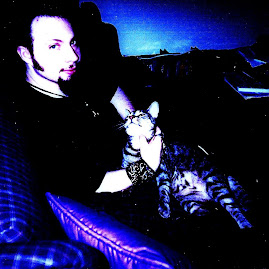I saw a book once called Cinematherapy. I seem to be someone who practices this on a regular basis. Since my father's death and the attendant stress that accompanies being executor of his estate, I've needed to lose myself more than ever in the world of film. Rather than wading through the deep slog of films I've experienced since my father passed away on August 18, I'm going to stick to the month of September - 23 days thus far (and 23 being a magick number is not lost on me). I make mention only of films I found particularly notable - especially good, especially bad, or merely possessed of something striking - be it touching, or shocking - that distinguishes it.
So September's most noteworthy viewing (beginning with the most recent and working my way back): I'm currently watching Closet Land, long a favourite of my wife, which we can finally view, as it's available only in PAL format on DVD. We now have a Blu ray/ DVD player that plays PAL or NTSC and enables other bells and whistles with an HDMI connection. So far, Closet Land is intriguing, and very well acted by its only two performers, Alan Rickman and Madeleine Stowe (a far cry from her current arch turn on TV's Revenge).
Last night I watched Salo, or the 120 Days of Sodom by Pier Paolo Pasolini. It had been awhile since I'd seen it, and I have to say, the deluxe Criterion remastering is breathtaking. There is a second disc, and a booklet, both filled with commentary placing this most notorious of films into context. Viewing it again, I still like Salo, though "enjoy" might not be an accurate assessment. I wrote a capsule review of Salo years ago for Video Eyeball magazine, and my overarching view of the film has not changed. Pasolini's contrast between cold modern austerity and a descent into scatological savagery parallels his earlier, and better, Porcile, as well as his Oedipus Rex, which I watched a week ago and was as stunned by as ever. Salo simply magnifies these concerns, and is a true terminal document of an artist, considering Pasolini's murder shortly after the film.
Two nights ago, I watched a handful of disparate films: John Cassavettes' Shadows, which I'd seen once before, was a wonderful snapshot of its era and milieu (fantastic soundtrack!) and heralded the coming of the most important voice of the American indie underground. On Netflix, Sarah and I watched Day Watch, sequel to the once-trendy Soviet horror Nightwatch (which we've not seen). Maybe I'm missing something crucial having missed the first installment, but Day Watch, despite some nice effects and photography, well, just wasn't that good. I received a free Day Watch T-shirt when I worked at Borders, but it was too small for me. Now I'm glad, as I wouldn't want to advertise such an overrated film.
Before my wife came home from work earlier that evening, I had a Judex-fest, watching the first 5 episodes of the original silent Judex serial by Feuillade, and the Georges Franju 60s remake, which artfully compresses the 5 1/2 hour original, with a minimum of changes, all well done. The original serial is one of my all-time favourite films, and one of my favourite flicks that falls under the rubric of the 'superhero film', as Judex is assuredly the blueprint for the likes of the Shadow and Batman.
The night before, I watched The Black Cat for the second time since recently purchasing it. Karloff and especially Bela Lugosi are wonderful in this (though David Manners, and his character, are rather goofy), and all that's been written about the expressionist architecture and satanic themes is spot-on, and marks this as an occult classic. Definitely my favourite Lugosi performance. Just don't expect it to have much to do with Poe. Afterwards, I gave Rene Clement's Purple Noon a spin. This one was far better than I recalled. It was playfully suspenseful all the way to the final shot, and I enjoyed it immensely. After viewing this Patricia Highsmith adaptation, I revisited its main character, Tom Ripley, played in Purple Noon by a very young Alain Delon, in a film where the role was essayed by Dennis Hopper. Hopper makes for an older Ripley - more scrupulous, but no less a capricious manipulator. This film was The American Friend, a great flick which remains my main connection to director Wim Wenders, as, unfortunately, I've not explored his ouevre overmuch.
Next: Cinematherapy 2!















.jpg)


.PNG)









No comments:
Post a Comment